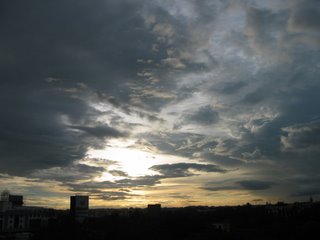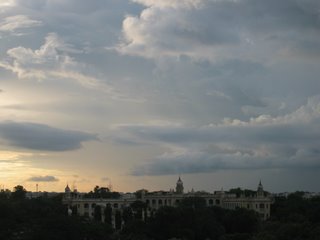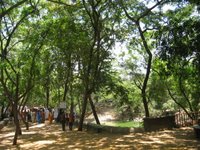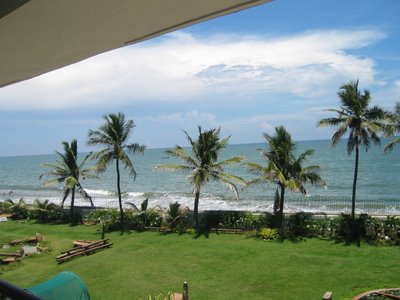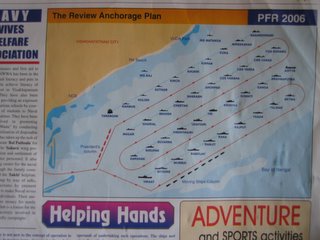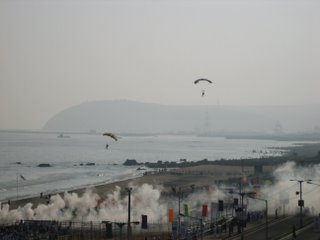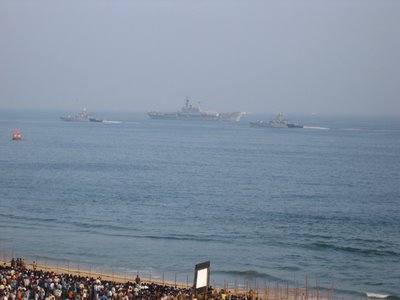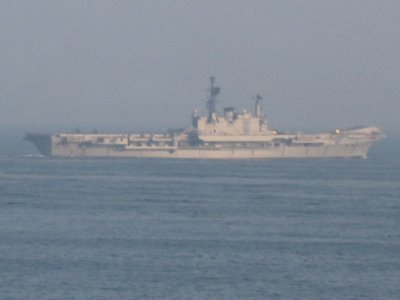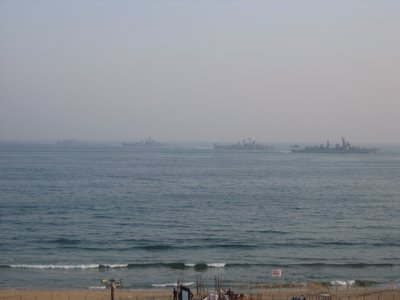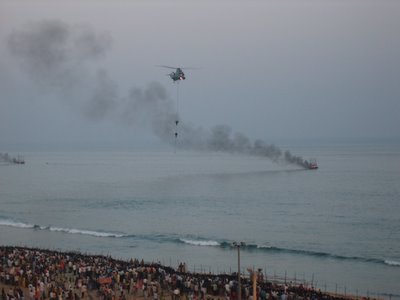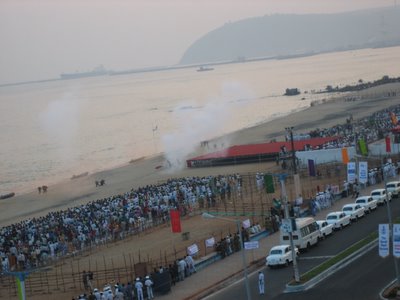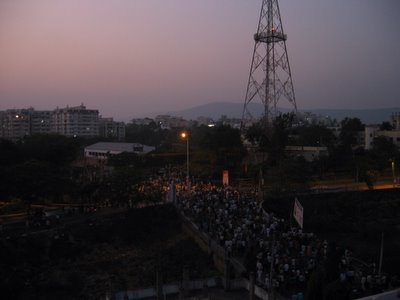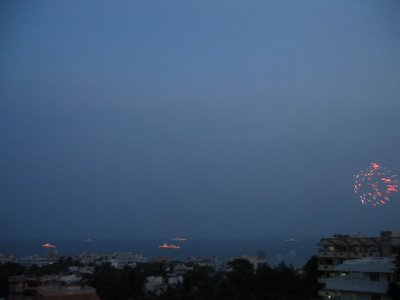Note:This must be read as a continuation of
this. One tends to write a lot more on trains, one finds.
Once again, is partly inspired by another
railway musing from
Veena.
September 4, 2004 - Egmore Station, ChennaiPer usual, diary writing efforts have come to naught. The blue pen exhibited symptoms of
Montezuma's Revenge very impressively and departed for its Penly Abode. Now a second (black) one is slowly puking its guts out and this may well turn out to be its swansong.
Much has come to pass since we wussed out, somewhere in the Rocky Mountains. In brief, I made it safely across the USA, spent a day sucking up to assorted people in Berkeley, hung out with P____ and C_____ in the Bay Area, flew off to bewildering Japan for an 8-day pilgrimage to various Shinto and Buddhist shrines, spent a couple days in a hammock next to a
pit full of crocodiles in Chennai, went
home (sweet home!), did laundry, went back to Madras and was given an F1 visa despite best efforts, went to Bangalore and met A___, K__, A___, D____, M____, K___, I___, R____, P_____, R____, back home for Amma's birthday/retirement celebrations, to Bangalore and Hampi with S____, R__ and M____, met P______ and B_______, and went to Thrissur, August 15
sadyaa in our new flat, many people, to Madras for P____'s and S____'s weddings, Coimbatore by "airbus", toy train to Ooty, window fell on fingers, Mudumalai for a day, there be elephants, back to Thrissur for Onam, Machad, Croc Bank again, and now here we are. The details will take forever to fill in, but there were enough incidents to fill up a small book. Much has changed in the last few weeks. Said "no" to Berkeley, which was drastic. No visibility yet into future, no plans. Ship to Andamans, Sri Lanka, Northeast, Kashmir are all possibilities.
October 2004 - Somewhere in Himachal PradeshLesson #1 - Never travel by the Visakhapatnam-Korba Express ever again. If you book a ticket to Delhi, you have to spend 9 hours sampling the charms of Raipur, Chhattisgarh (where you detrain at 7 a.m.) before your connecting train, the Chhattisgarh Express from Bilaspur shows up and takes you to Delhi.
Lesson #2 - Never travel by the Chhattisgarh Express. It is a clear case of a piffling Fast Passenger putting on airs and pretending to be an Express.
All the people around me when I got on the Korba Express in Vizag were North Indians. Or more properly, no one was South Indian. This has not happened to me in an age and it seemed like I was in a North Indian island inside Vizag. Flashes of irrational panic!
The atmosphere, the to and fro, is very different than in a southbound train, My highly prized, newly purchased copy of "Trains At A Glance" was almost immediately appropriated by Mr. Lower Berth. Mr. Kantabanji is in the opposite seat. Mid-twenties, traveling with what appeared to be most of his clan. Kantabanji, as I was to discover at two in the morning, is a one buffalo town on the Orissa-Chhattisgarh border. My buddy had brought his sister to Vizag "for medical purposes". Apparently that is the only thing Vizag is good for. If you take away the hospitals, Vizag would plumb the depths (he indicated the plumbing of depths with a heartless gesture). I wanted to ask him what he thought about the port, shipyard, naval base, steel plant, refinery, university and such, but desisted. Not everyone is a Vizagite and therefore perfect.
Mr. Kantabanji went on to give me a detailed autobiographic account, after I'd summarized my hitherto worthless existence. He is a wholesaler for FMCG in the area. His father is a social servant. Before that, he (the father) used to be Mayor. Mr. K himself wasn't too good at studying, although he was intelligent. Until some
uncleji drilled some sense into him and he began mugging in earnest. In any case, it turns out that he went for a movie on the same day as his 10th standard exams, so the studying wasn't too fruitful.
K's younger brother was apparently a sort of Newton-Gauss-Archimedes rolled into one. However, he too was not interested in studying. K had to help out by visiting the sibling's college professor and acquiring information on the likely questions appearing in the exams, after a small payment, of course. He was very proud of this achievement, and prouder still that the errant kid
actually studied for those questions and wrote the exam, unlike his dishonest friends who took "slips" to the exam.
K also had a lot of things to say about lodge owners in Vizag, in particular the one where he had stayed at. Apparently some insult had occurred and one of K's buddies was due to arrive in Vizag in a day or two to thrash the offender. K is a great believer in thrashing. Nothing like a few blows exchanged to resolve a confrontation, was his motto. "He hits you, you hit him, end of matter.", as he put it.
Somehow, I liked him. He seemed like the sort of person who wouldn't think twice about strangling your allegedly cheating grocer on your behalf, simply because you met him (K) once on a train for a few hours and he's your "friend" now. Since we were close friends, he showed me all the lewd SMS messages he had saved on his phone; verified (by the process of plucking it out of my pocket before I could say anything and going through the messages) that I had none on my phone; asked me to exchange berths so that his sister's brother-in-law's aunt's sister-in-law could get a lower berth. When he led off his cackling brood in the morning, he cheerfully woke me up and gave me back my berth. Peanut shells scattered all over the floor were the only signs of "The Passing Of The Grey Company".
Next morning was hot. You could tell that it was the sort of day the Deccan Plateau loved to dish out, as early as 7 a.m. We pulled into Raipur where Mr. Lower Berth urged me to repair to the first platform and the waiting room as soon as possible. He then proceeded to put his preaching into practice. I stood on the platform for a little while, feeling orphaned.
Crossing the overbridge to #1, I first tried to go to the cloak room to deposit my backpack. Quickly changed my mind and went back to #2 to see if they would detach my compartment and later attach it to Chhattisgarh Express. Then I could stay put in the safety of the Indian Railways coach and bide my time. But no, just as I descended the steps to the platform, the entire bloody train buggered off in the direction of Bilaspur, coach and all.
So I lugged myself back to #1, brushed my teeth at the platform tap, made sure at the enquiry counter that my seat would be available when the train came in the afternoon, had breakfast at the canteen. By now I'd calmed down somewhat. Memories of many such interludes spent in Vijayawada station with family, when we used to Kerala for summer holidays. The whole Coromandal-Jayanthi Janatha experience reprised!
I managed to get a retiring room overlooking #1 for Rs. 110. It was a large room with a high roof and two beds. A three-room shower-loo-washbasin complex was attached. All seemed very Raj. Quick shower. Nap till 11. I locked the room and ventured out into Raipur, in a much better frame of mind than when I'd arrived.
Raipur hit me almost immediately. Once again an overwhelming, irrational, panic. Of dislocation from the south. Where, pray, was I? And what was I doing there? Raipur is ostensibly a state capital. You wouldn't think it if you saw it. The station road is a dusty hot strip of stores selling hardware, medicines etc. Potholes, filth, dust, heat, incessant buzz of something. In a bit of a daze I walked along until I came to "Parbhat Talkies". "Parbhat Talkies" appears to be one of the more happening places in the vicinity of the station. A bunch of trendily dressed college kids (Or were they school kids? One can't really tell nowadays.) were hanging out, probably cutting class. All seemed very jolly, happy, and blissfully unaware of the fact that they were in Raipur. Saw "Dhoom", which wasn't as bad as I thought it would be. Hema Malini's daughter is cute! And a bomb to boot!! That rhymes!!! I was too restless, couldn't wait for the movie to end, the whole Raipurness of the place was stifling. This is what Mandna must've felt like to Agastya Sen.
Staggered back to the railway station and had lunch at the canteen. En route, I managed to get a new strap for my watch, for an incredible Rs. 20. The look on the shopkeeper's face when I asked for something "not too pricey, in the Rs. 50 range" was priceless. He only had straps in the Rs. 20 range!!
The window of my room in the Raipur station overlooked the lone metre gauge platform. Sometime in the hot dusty afternoon, a decrepit, forlorn train sidled off. Was reminded of Bill Aitken's journeys. Wonder where this one was headed. Too hot and lazy to find out.
Chhattisgarh Express, previously referred to as the "Bokaro-Alleppy of North India" by Mr. Kantabanji, rolled in at its appointed hour. Mr. Lower Berth - who unbeknownst to me, had run some errands in the morning, and had watched movie along with me - showed up on the platform and we boarded together. I was somewhat relieved to see him again.
Mr. K wasn't joking about this train, it stopped everywhere and let on everyone and their joint families. Morning found us in Bhopal and Mr. LB got off. I was sorry to see him go. He shook my hand as he left, and I daresay he was as "emotional" as I was. I began to treat the riff-raff inter-city daily traffic along the Kazipet-Delhi line with the customary contempt and superciliousness that the South Indian with the reserved berth reserves for such unfortunates.
At Jhansi, while we waited, pointed northwards, a Vizag bound train from Delhi pulled into the adjacent platform. Once again, I was possessed by the terrible urge to grab my bags, run across, bribe the TTE, guard, driver, station master, pantry car workers, whoever it took, to let me aboard and carry me home!
Evening found us near Mathura and Vrindavan. The evening light filtering through the dust made for pleasant basking. The landscape had changed, from the aridity of the Deccan, to the gorges of the Chambal valley, and later to the verdant fields and farmlands of what must be the Indo-Gangetic Plain. But, for all the variety, rural India remained beautiful to look at, at least from the train window. I was to discover in the succeeding weeks that Himachal Pradesh from a bus, Ladakh, the farmlands near Kanpur, the Aravalis near Alwar and Sariska, Punjab, Haryana were all green, lush and beautiful. From windows!
